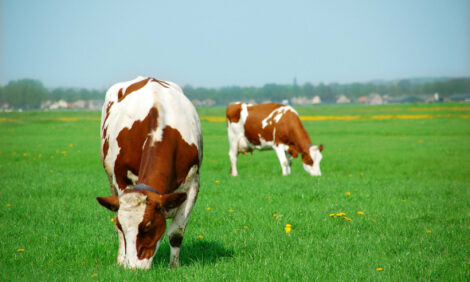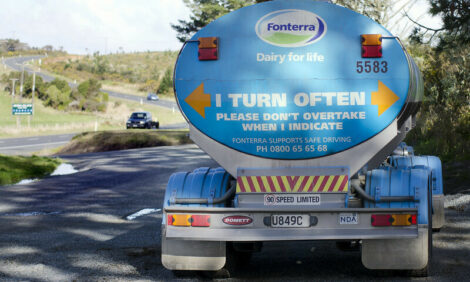



New Strategic Plan Adopted at OIE World Assembly
FRANCE - The world assembly of national delegates to the World Organisation for Animal Health has adopted a 5th Strategic Plan for pursuing OIE global missions in animal health and welfare.
The delegates of the 176 OIE members adopted the 5th Strategic Plan which sets a road-map for OIE global missions in animal health and welfare over the years 2011-2015.
The Plan sets new fields of action for the organisation:
- More activities directed to food security, poverty alleviation and animal health and veterinary public health
- More focus on the 'One Health' concept and other matters of cooperation with partner organisations, and
- The impact of climate and environmental changes on animal disease emergence and occurrence as well as the impact of animal production on climate change.
The Plan also provides for a continuation of priorities emphasized in the previous Plans, in particular the 4th Strategic Plan (2006-2010):
- Communicating international animal disease and zoonoses information globally
- Development and implementation of scientifically based standards and guidelines
- Prevention, control and eradication methods of animal diseases including zoonoses
- Compliance with the 'Good Governance' concepts and capacity building for national veterinary services
- Strengthening the Organisation's influence on policy design, applied research and governance, and
- Communicating OIE information.
For leading the implementation of the new Plan, the World Assembly of Delegates renewed its trust in Dr Bernard Vallat and elected him by secret ballot for a third five-year mandate as Director General of the OIE.
A global review of animal health and key issues debated
The worldwide animal health situation concerning 118 diseases of terrestrial or aquatic animals was examined in detail with OIE Members during the Assembly.
Two technical items on issues of interest for the international community in the field of animal health and welfare were debated during the Session:
- Private sector's point of view on the use of public and private standards, and
- Economic aspects of the Veterinary Services.
Key work of the Assembly
The Delegates approved the new list of countries and zones that had applied for official OIE recognition of their status with respect to one or more of four priority diseases: bovine spongiform encephalopathy (BSE), foot and mouth disease, contagious bovine pleuropneumonia (CBPP) and rinderpest.
With regard to BSE, the OIE newly recognised India and Peru as having a 'negligible risk' status, while the Republic of Korea and Panama were recognised as having a 'controlled BSE risk status'.
Botswana, Lesotho, the Philippines, San Marino and Turkey were newly recognised as being 'free of foot and mouth disease, with or without vaccination, for all or a part of their territory'. And after close to nine years, Swaziland recovered its foot and mouth disease 'free status without vaccination'.
The Organisation reiterated the aim that it shares with FAO, namely to be able to declare that rinderpest has been eradicated worldwide in 2011.
Within the framework of its annual standard-setting work, the Assembly adopted and/or updated 56 chapters of the OIE Terrestrial Animal Health Code, among others on:
- The use of animals in research and education
- Some welfare aspects in farmed fish activities
- The control of antimicrobial resistance in aquatic animals, and
- The handling, disposal and treatment of aquatic animal waste.
Working for high-quality national Veterinary Services everywhere
The delegates welcomed the North-South or South-South twinning of about 30 laboratories within the framework of the OIE's Twinning Programme, which encourages the exchange of competency and experience between existing OIE Reference Laboratories and Collaborating Centres, and candidate laboratories in in-transition or developing countries.
The Delegates also accredited two new Collaborating Centres and four new Reference Laboratories, bringing the number of official centres of scientific excellence within the OIE worldwide network to 227.
Furthermore in line with OIE's continuous engagement to support Veterinary Services comply with OIE standards on quality, 93 PVS (Performance of Veterinary Services) independent evaluations made by OIE-accredited experts were reported to the Assembly. To date, 22 PVS Gap analysis missions and 11 missions supporting the modernisation of legislation have also been carried out worldwide.
Other notable events marked the proceedings of the Assembly, including the presentation of the World Veterinary Day Award 2010 to the University of Veterinary and Animal Science in Lahore, Pakistan for its successful celebration of World Veterinary Day under the theme 'One World, One Health: more cooperation between veterinarians and physicians'. The OIE Gold Medal was given to Dr Emerio Serrano from Cuba.
Around 600 participants, representing OIE Members and intergovernmental (FAO, WHO, World Bank, WTO, etc.), regional and national organisations took part in the event. High-ranking authorities including the HRH Princess Haya Bint El Hussein and numerous Ministers of OIE Members honoured the Assembly with their presence.
TheCattleSite News Desk


